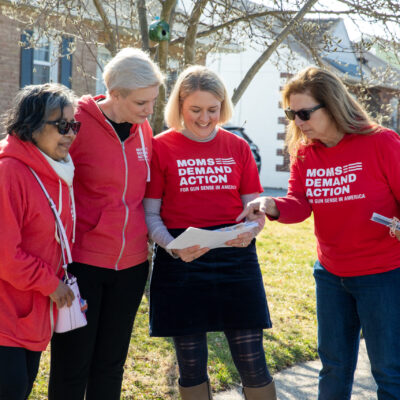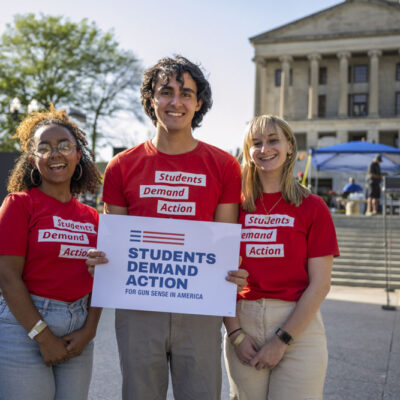Armed Extremism
What Is The Problem?
The U.S. faces a confluence of dangerous challenges from white supremacists, anti-government militias, and other armed groups and individuals of the extreme right that seek to perpetrate violence, spread conspiracies, traffic in hate speech, and engage in armed intimidation. Guns and gun rights are central to many extreme-right groups and individuals.
There has been an increase in counterprotesters and militia members carrying guns openly at protests. In addition, the insurrection at the U.S. Capitol in January 2021 and several other arrests of extremists in the past year underscore the violent threat posed by armed extremism. These individuals and groups are often motivated by conspiracy theories, violent rhetoric, and hate. Failure to address this threat will lead to the continued growth of extremist groups and violent incidents.
For decades, the gun lobby has not only enabled access to guns by anti-government and white supremacist extremists through its advocacy against common-sense gun laws, but has also worked to harness their fixation on guns to shore up its own political power; in doing so, the gun lobby has amplified extreme right politics to new and broader audiences.
What do armed protests look like?
Armed protestors around the Michigan State Capitol in April 2020

Why is it an issue?
Armed extremism poses a threat to our democracy.
The deadly insurrection attempt at the U.S. Capitol on January 6, 2021 was fueled, in part, by gun rights extremists. They brought their guns to Washington to stop the certification of the electoral college votes. At least nine people who were at or around the Capitol have been arrested on weapons charges. Thousands of rounds of ammunition were recovered by authorities.
The attack on the Capitol is not the only example of an armed assault on democracy. In 2020, anti-government extremists and white supremacists used guns as tools of intimidation and violence in increasingly open ways. They did this by taking advantage of weak state gun laws to brandish weapons at anti-government protests, to intimidate peaceful protests for racial justice, and in plans and actions to kill. Examples of the rise of violent extremism across the country in 2020 include heavily armed protesters in Virginia, a self-described militia member killing two people and wounding another in Wisconsin, and a plot to kidnap Michigan Governor Gretchen Whitmer. This type of violence chills legitimate democratic speech and undermines our democratic institutions.
To prevent armed extremism, strong gun policy is critical. Lawmakers must address violent extremists’ access to firearms and establish clear and strong legal standards on what conduct is not acceptable in our democracy.
What are the solutions?
-
Alert Local Law Enforcement of Failed Background Checks
The National Instant Criminal Background Check System (NICS) stops thousands of convicted felons, domestic abusers, and other prohibited people from buying guns each year. Potential purchasers often fail NICS background checks and walk away with no consequences, free to try to arm themselves in other ways.
-
Background Checks on All Gun Sales
Background checks are the foundation of any comprehensive gun violence prevention strategy. Current federal law requires that background checks be conducted whenever a person attempts to buy a gun from a licensed gun dealer. This is to ensure that the buyer is not legally prohibited from having the gun. Since federal law began requiring these background checks in 1994, background checks have blocked millions of sales to people with felony convictions or other prohibiting histories.1United States Department of Justice, Office of Justice Programs, Bureau of Justice Statistics, “Publications & Products: Background Checks for Firearm Transfers,” https://bit.ly/2F4vMYw. Data on federal- and state-level denials were obtained from the BJS reports for the years 1999–2010 and 2012–2020. Local-level denials were available and included only for the years 2012, 2014–2018, and 2020 from the BJS reports. Data for the years 2011 and 2021 were obtained by Everytown for Gun Safety from the FBI directly. Though the majority of the transactions and denials reported by the FBI and BJS are associated with a firearm sale or transfer, a small number may be for concealed-carry permits and other reasons not related to a sale or transfer.
-
Disarm Hate
Guns and hate are a fatal combination. In an average year, more than 25,000 hate crimes in the United States involve a firearm—more than 69 each day.1Everytown Research analysis of the National Crime Victimization Survey (NCVS). A yearly average was developed using 12 years of the most recently available data: 2010 to 2021. In parts of the US, some people convicted of hate crimes can still legally buy and have guns. Congress and state legislatures must pass laws that keep guns out of the hands of those who have been convicted of hate crimes.
-
Extreme Risk Laws
When a person is in crisis and considering harming themselves or others, family members and law enforcement are often the first people to see the warning signs. Extreme Risk laws, sometimes referred to as “Red Flag” laws, allow loved ones or law enforcement to intervene by petitioning a court for an order to temporarily prevent someone in crisis from accessing guns.
-
Prohibit People With Dangerous Histories From Having Guns
People with dangerous histories must be prohibited from having guns. Federal law prohibits gun possession by certain categories of people. States also set standards for who is too dangerous to have guns. People prohibited by federal or state law will fail a background check if they try to buy a gun from a licensed dealer.
-
Prohibit Open Carry
Carrying firearms visibly in public, known as open carry, is a dangerous policy. It is exploited by white supremacists and opposed by law enforcement and the public. Members of hate groups regularly openly carry guns in a show of intimidation.
-
Prohibit Assault Weapons
Assault weapons are exceptionally deadly firearms commonplace in mass fatality shootings. They are generally capable of firing far more bullets, far faster than manual-action hunting rifles. Prohibiting assault weapons can prevent mass shooting injuries and deaths.
-
Prohibit High-Capacity Magazines
Firearms equipped with high-capacity magazines make instances of violence exceptionally deadly. High-capacity ammunition magazines, commonly defined as those capable of holding more than 10-rounds, are a threat to public safety and should be prohibited.
-
Strong Standards for Carrying Concealed Guns in Public
Carrying guns in public is a tremendous responsibility. States should set strong minimum standards for carrying concealed guns in public to ensure that people who are too dangerous or irresponsible to carry guns in our communities are blocked from doing so.
-
Require Permits to Carry Concealed Guns in Public
It is legal to carry a concealed handgun in public in all 50 states. States have traditionally required a person to have a permit to carry a loaded, concealed handgun in public. States should not allow the carry of concealed guns in public without one.




